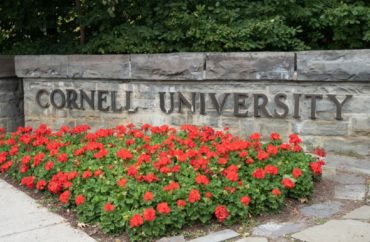
ANALYSIS: University adds 1,100 administrative support positions since 2013
Cornell University employs one administrator for every two undergraduate students, according to an analysis by The College Fix.
During the 2022-23 school year, the most recent data available, the university had 7,764 full-time administrators and support staff, according to information the school filed with the federal Integrated Postsecondary Education Data System.
Administrators and support staff include management, student and academic affairs divisions, IT, public relations, administrative support, maintenance, legal, and other non-academic departments.
Full-time student enrollment that year was 15,685, making the ratio of undergrads to administrators and support staff 495 to 1,000, or one to two.
Comparatively, a decade ago, the Ivy League school had 460 administrators and support staff positions per 1,000 undergrads during the 2013 school year, IPEDS data shows.
Cornell created more than 1,100 new positions in a decade, going from 6,619 administrative and support staff in 2013-14 to 7,764 in 2022-23, according to the data.
Full-time undergraduate enrollment also increased by 1,305 and teaching and instructional staff by 352 across that same 10-year period, but the ratio of educators to students remained basically the same: about one to five.
Since 2013, the prestigious New York institution, known for its science and agricultural programs, also has increased tuition by more than $20,000 – almost 50 percent – from $45,130 to $65,204 for the current year.
Much of the administrative growth has focused on bolstering diversity, equity and inclusion efforts.
For example, Cornell hired a dean of inclusion in its College of Veterinary Medicine in October 2020 as part of its “efforts to address the issues of diversity, equity and inclusion,” the college’s Dean Lorin Warnick said at the time.
Contacted this week about the analysis, a Cornell spokesperson declined to comment to The College Fix.
Faculty concerns
Two Cornell professors told The Fix that they have seen a notable rise in DEI administrative hiring since the George Floyd protests in 2020.
“DEI has become a campus administrative obsession, quasi-religious in nature, including not only coursework and programming, but events and a ‘land acknowledgement’ read at campus events and attached to administrative emails,” law Professor William Jacobson told The Fix in an email Monday.
Randy Wayne, a research scientist and professor of biology, told The Fix in a phone interview last week that he believes DEI is taking away from the teaching mission of Cornell. In recent years, Wayne said he has watched the number of classes decrease and the number of DEI efforts increase – including in STEM fields.
“You can’t turn around without seeing something about DEI,” Wayne said, describing it as “an infestation.”
Part of the increase in administrative hiring is due to normal growth, but administrators’ focus on DEI and bureaucracy also is a big factor, Wayne said.
For example, the School of Integrated Plant Science has four associate directors, one for teaching, one for research, one for the extension, and one for DEI; and administrators put the DEI director in charge of hiring, Wayne said.
Additionally, the school website states that it was founded on “settler colonialism, indigenous dispossession, slavery, racism, classism, sexism, transphobia, homophobia, antisemitism, and ableism.” The statement has been up since at least 2021.
Both Wayne and Jacobson also expressed concerns about “group-identity ideology” and bureaucracy replacing the focus on the individual.
“When you have a bureaucracy, everybody begins to serve the bureaucracy, and that changes everything. People lose their individuality at every level, whether to do science at the individual level, or be a student at the individual level,” Wayne told The Fix.
Jacobson added that “the senior administration continues to push DEI, so expect the administrative/support staff expansion to continue in this area.”
DEI expansion
This month, Cornell is set to open a Center for Racial Justice and Equitable Futures. The center will “connect and amplify” the university’s racial justice and inequality research and “develop more just and equitable public policy,” according to the Cornell Chronicle.
This focus can be seen throughout Cornell’s education programs already.
The university has had a DEI officer for its hotel administration program since at least 2015, according to the LinkedIn profile for Victor Younger, director of diversity and inclusion for the School of Hotel Administration.
Meanwhile, its College of Agriculture website prominently features a diversity and inclusion page that highlights its mission to “cultivate an inclusive community by incorporating data-informed equitable practices that empower individuals, foster engagement, and advance equal opportunities for all.”
One article linked to on the page promotes a new “sensory room” that “provides refuge” to students who feel stressed or overstimulated.
Within the agricultural school, the Center for Research on Programmable Plant Systems, or CROPPS, employs a DEI specialist to “plan, coordinate, execute, and document initiatives for growing diversity” in the agricultural research program.
The agricultural college also sponsored a “safer science” webinar in 2021, supported in part by taxpayer funding from a National Science Foundation grant, about “identity prejudice” and “safe fieldwork strategies for at-risk individuals.”
Currently, the university is hiring a vegetable field research technician who, according to the job post, must show a “demonstrated commitment to supporting diversity, equity, access, inclusion, and well-being.” Other job openings also mention these DEI priorities.
Numerous committees within the various departments and colleges at Cornell are centered around “diversity” as well.
Examples include: the Arts & Sciences Diversity Committee; Astro Climate & Diversity Committee; Department of Microbiology Diversity, Equity and Inclusion Council; Psychology Diversity Committee; and the Diversity, Equity, Inclusion, and Anti-Racism Committee in the Earth and Atmospheric Sciences Department.
Pushback
In 2021, Cornell made headlines for removing a bust of Abraham Lincoln from one of its libraries under the auspices of DEI. It eventually returned it in 2022 after reporting by The College Fix and subsequent alumni uproar.
Cornell recently has been under fire by many alumni who say the institution has essentially been corrupted by DEI. In August, the Cornell Free Speech Alliance published a 100-page report calling for sweeping policy changes on campus.
After top administrators ignored and snubbed the recommendations, last week, a major Cornell benefactor announced he will stop donating until Cornell eradicated DEI from its curriculum and policies.
In recent months, Cornell also has been hit with numerous antisemitism controversies, including two students who called for violence against Jews and a professor who said he felt “exhilarated” in response to the Hamas terrorist attack in Israel in October.
A 2022 College Fix analysis of voter registration data found Democrats outnumber Republicans professors 98 to one across six humanities departments at Cornell.
MORE: Vanderbilt has 1 administrator for every 2 students: analysis
IMAGE: Amy Lutz/Shutterstock
Like The College Fix on Facebook / Follow us on Twitter






Please join the conversation about our stories on Facebook, Twitter, Instagram, Reddit, MeWe, Rumble, Gab, Minds and Gettr.